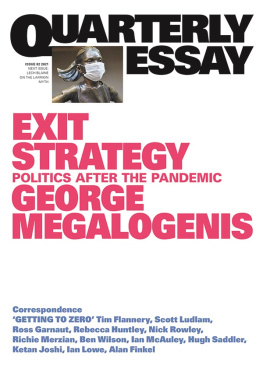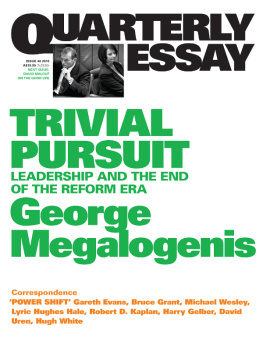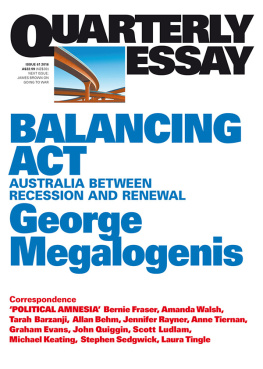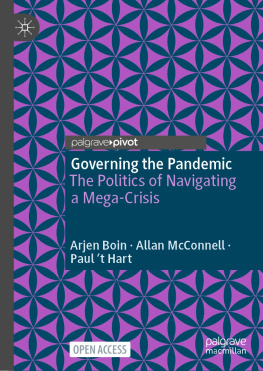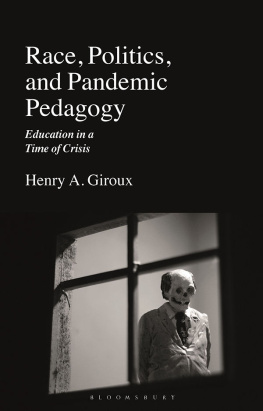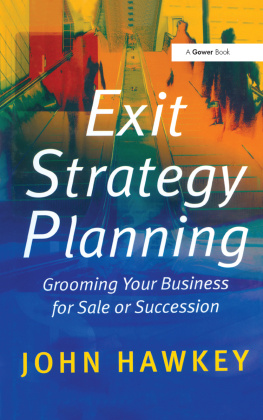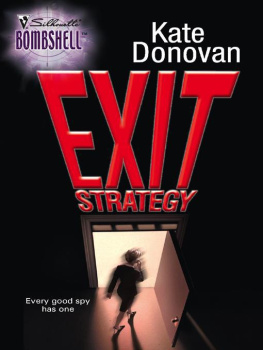Quarterly Essay is published four times a year by Black Inc., an imprint of Schwartz Books Pty Ltd. Publisher: Morry Schwartz.
ISBN 9781743821701 ISSN 1832-0953
All Rights Reserved.
No part of this publication may be reproduced, stored in a retrieval system, or transmitted in any form by any means electronic, mechanical, photocopying, recording or otherwise without the prior consent of the publishers.
Essay & correspondence retained by the authors.
Subscriptions 1 year print & digital (4 issues): $79.95 within Australia incl. GST. Outside Australia $119.95. 2 years print & digital (8 issues): $149.95 within Australia incl. GST. 1 year digital only: $49.95.
Payment may be made by Mastercard or Visa, or by cheque made out to Schwartz Books. Payment includes postage and handling.
Subscribe online:
quarterlyessay.com
Phone: 61 3 9486 0288
Correspondence should be addressed to:
The Editor, Quarterly Essay
Level 1, 221 Drummond Street
Carlton VIC 3053 Australia
Phone: 61 3 9486 0288 / Fax: 61 3 9011 6106
Email:
Editor: Chris Feik. Management: Elisabeth Young. Publicity: Anna Lensky. Design: Guy Mirabella. Assistant Editor: Kirstie Innes-Will. Production Coordinator: Marilyn de Castro. Typesetting: Duncan Blachford.
EXIT STRATEGY | Politics after the Pandemic |
George Megalogenis |
Australia has a justified reputation for avoiding the super-shocks of the twenty-first century. Twice now we have been the exception to the global rule of systems failure. Ours was the only developed economy in the G20 that did not fall into recession during the global financial crisis of 200809, and we were one of only a handful of nations to eliminate community transmission of COVID-19 during the pandemic of 2020 and 2021.
Yet our policy ingenuity and social cohesion in the face of existential threats were undermined on both occasions by poor leadership once the immediate crisis passed. Twice now weve seen prime ministers at the peak of their domestic popularity fumble the reform tests they set for themselves.
When Scott Morrison broke his promise to vaccinate Australians by October 2021, voters would have felt a shiver of recognition. The manner of the backdown not just the fact of it, but the sneaky way it was communicated echoed Kevin Rudds politically fatal decision eleven years earlier to walk away from his great moral challenge of climate change.
The Liberal prime minister did not reveal the changes to his program in the formal setting of a press conference. Nor did he issue a statement on his official media site. Morrison waited until a Sunday evening, after the television news bulletins had gone to air and the first editions of the next mornings papers had been printed, to issue a short, carefully worded statement on his Facebook account. The Government has not set, nor has any plans to set new targets for completing first doses, he wrote on 11 April. While we would like to see these doses completed before the end of the year, it is not possible to set such targets given the many uncertainties involved. Future historians will be confronted by a deliberate gap in the official timeline. They will see the first confident announcement on the prime ministers website last August that Australians would be at the head of the global queue for vaccines. They will see the dissembling as targets were missed, culminating in Morrisons snippy insistence as recently as March that the revised program at least one jab by October was on track. But the admission that the exercise had run off the rails will not appear in the official record.
It was too smart by half. The vaccine rollout is the final and most difficult element in our great escape from the pandemic, demanding consistent leadership, public service competence and a high degree of community trust. Morrison, of all people, would know that a late-night post on Facebook, the home territory of anti-vaxxers and conspiracy theorists, risks confidence in the program. Only two months earlier, the prime minister had advised us where not to go for health advice: Dont go to Facebook to find out about the vaccine. Go to official government websites.
When Rudd shelved his plans for an emissions trading scheme in 2010, he hoped to bury the announcement in the May budget papers. But the plan was foiled by journalist Lenore Taylor, who broke the story in The Sydney Morning Herald on 27 April. What the Labor prime minister should have done next was call a press conference at Parliament House to explain his decision. But he doubled down on his strategy of deflection by inviting the media to the Nepean Hospital in Penrith for a discussion of health policy. The local journalists refused to play the game. The first six questions were on climate change, and the long, tortured answers confirmed the futility of the exercise.
Rudd: Given that international action has been slower than was originally anticipated and given the fact that the Liberal Party has now backflipped completely on this position and therefore the legislation has not been passed given those two factors, its very plain that the correct course of action is to extend the implementation date.
Compare with Morrison in 2021: Now, Ive been asked a bit about what our targets are. One of the things about COVID is it writes its own rules. You dont get to set the agenda, you have to be able to respond quickly to when things change. And its certainly the case over the course of this past year, weve had to deal with a lot of changes.
Rudd and Morrison were claiming to be both hero and innocent victim. They had steered Australia through the respective storms of the GFC and the global pandemic, thereby making us the envy of the world. But now sinister forces beyond their control had undermined their best intentions.
Rudd did not get away with it. The government lost the support of around one million voters in just a fortnight, Labor frontbencher Mark Butler wrote in his book Climate Wars. One voter told me in my electorate of Port Adelaide, I was never really sold on the whole climate issue, but was willing to back you in anyway but when you just suddenly dropped the thing because things got too hard, you lost me. I thought you were all piss-weak. Within two months, Julia Gillard took Rudds job. Within four months, Labor was reduced to a minority government. Public satisfaction with democracy had been at a record high when Rudd led Labor into office at the 2007 election. It went into freefall in 2010, after his removal as prime minister, and by decades end had crashed to its lowest level since the constitutional crisis of the mid-1970s, while trust in government hit an all-time low.
Morrison had risen at the bottom of this long cycle of disillusionment; the fourth prime minister in eight years to claim power through the back door of a party-room coup. He took office in the winter of 2018 with no expectations, and exceeded them when he led his exhausted government to a narrow victory at the May 2019 election. His successful campaign was built around a relentless attack on an unpopular opponent, Bill Shorten, and a caricature of Labors spending and taxing policies. It was no more outrageous than Labors own scare campaign against the government in 2016. But Morrison made no attempt to talk up his own agenda. He assumed voters were disengaged, and directed that cynicism at his opponent. Undermining trust in government was a precondition for victory.
The prime minister drove that trust to even deeper lows with his passive and aggressive response to the Black Summer of fires, telling Australians he didnt hold a hose, mate. All the world came to know him as the leader who had snuck off to Hawaii for a family holiday while his country burned. With expectations reset at zero, he exceeded them once more with his handling of the pandemic, only to revert to a point somewhere between the two extremes with the vaccine program. The setback might not hurt Morrison politically while voters remain comfortable with the security blankets of closed borders and economic stimulus. But a third wave of the coronavirus, requiring another extended lockdown, would test the electorates patience. Either way, Australia is once again in danger of snatching mediocrity from the jaws of achievement.

